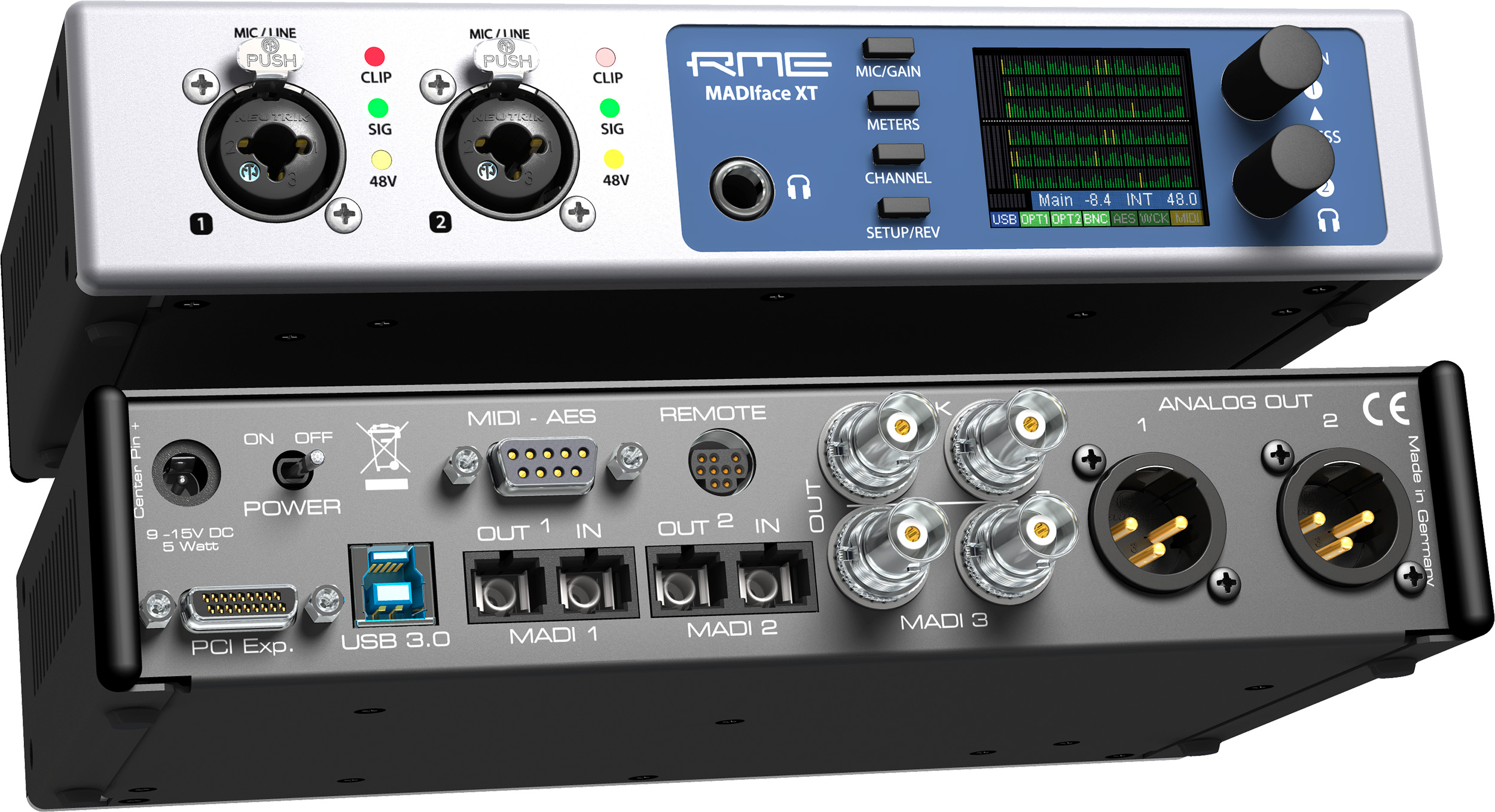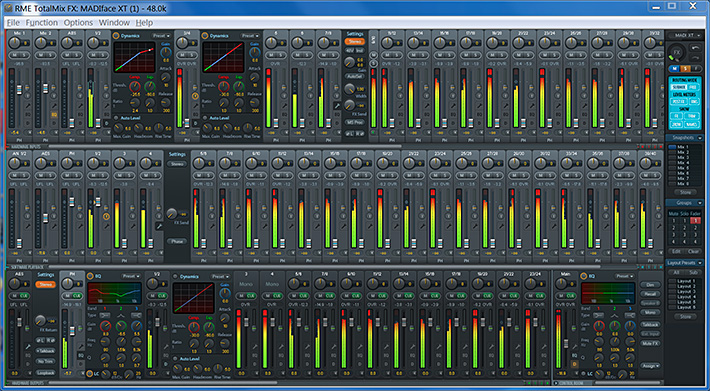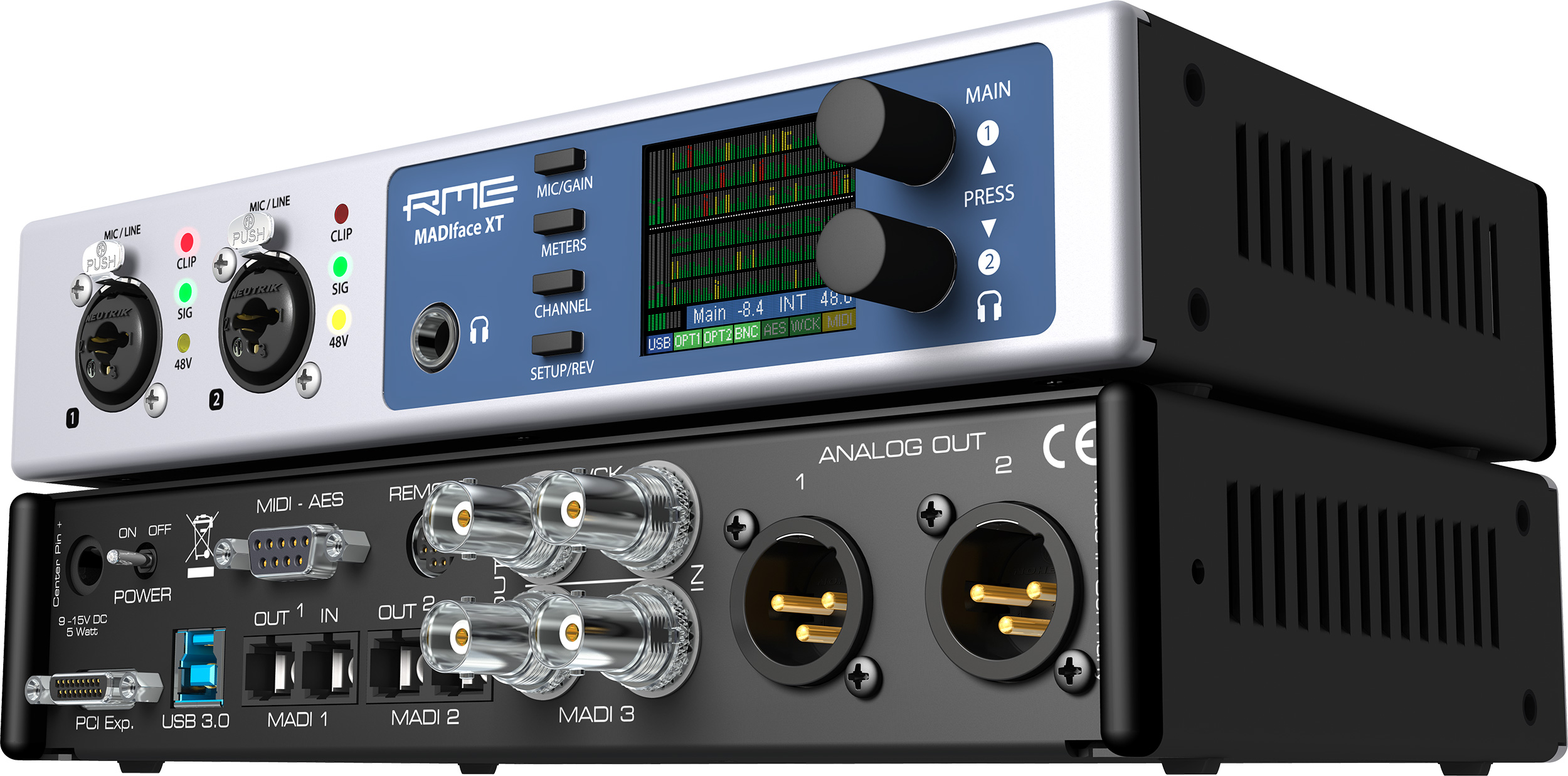RME MADIface XT

Overview
Connectivity
- 196 Input / 198 Output channels
- 2 x MADI I/O optical
- 1 x MADI I/O coaxial
- 2 x Analog Mic/Line Preamp Input (XLR/TRS)
- 4 x Analog Output (Main XLR + Phones)
- 1 x AES/EBU I/O via breakout cable
- 1 x MIDI I/O via breakout cable
- 3 x virtual MIDI I/O via MADI I/O
RME's MADIface XT is the world's first USB3 audio interface - and the world's smallest portable interface that provides access to hundreds of audio channels in such a small package. For highest usability and connectivity the XT can also be used with USB 2.0 (computer I/O limited to 70 channels). Its unique PCI Express port connects to External PCI Express cards as well as adapters to Thunderbolt, providing all the fastest interfacing technologies available for maximum channel count and lowest latency in one unit.
To bring together the most complete I/O set for live or studio usage, two digitally controlled high end mic/line preamps, two balanced line outputs and one stereo phones output are included. Full stand-alone operation with remote control over MADI plus TotalMix FX for unlimited mixing, routing and processing open an endless world of possible applications.
For the most convenient desktop operation RME's Advanced Remote Control can be connected (option).
Features
The RME MADIface XT is capable of transferring digital audio data directly into a computer, from any device equipped with a MADI interface. Analog sources can be connected to a stereo analog input, and 2 stereo analog outputs add full monitoring connectivity. Installation is simple, even for the inexperienced user, thanks to the latest Plug and Play technology. The numerous unique features and well thought-out configuration dialogs put the MADIface XT at the very top of the range of digital audio interfaces.
Front Panel

The front of the MADIface XT has 2 XLR/TRS line and microphone inputs, a stereo line/headphone output, two rotary encoders with push functionality, four menu keys, a graphical colour display, and six status LEDs.
Mic/Line Inputs. The Neutrik combo sockets of the two Mic/Line inputs provide XLR and 6.3 mm / 1/4" TRS connection. They have LEDs for Signal (SIG), Overload (Clip) and phantom power (48V).
Headphone Output. Channels 3/4 feed the headphone output, which also operates as high-quality unbalanced line output.
Display. The display main screen (Global Level Meters) shows the current state of interface mode (PCIe orange, USB 2 yellow, USB 3 blue), the sync state of MADI and AES inputs, and incoming and outgoing MIDI data.
The four keys, the two encoders 1 and 2, the high-resolution and clear colour display, and a well thought-out menu structure enable the user to quickly change and configure the device’s settings completely without a computer. Help notes and clear markers in the display guide the user through all functions. The rotary encoder 1 and 2 set the monitoring volume of the rear and front output directly at the device.
Rear Panel

The rear panel of the MADIface XT has two balanced analog outputs, word clock I/O, MADI coaxial I/O, two MADI optical I/O, USB 3 port (compatible to USB 2), PCI Express connector, MIDI/AES I/O, the power socket and a power switch.
Balanced Line Level Outputs. 2 balanced analog outputs via XLR.
Word Clock I/O. BNC. In menu Options – Clock the input can be set to be terminated with 75 Ohms.
MADI I/O coaxial: Standard coaxial MADI ports.
MADI I/O optical: 2 x standard optical MADI ports.
Remote. Mini-DIN. Connector for the optional remote controls with Volume, Store, Dim and Recall functions.
MIDI I/O and AES/EBU I/O. D-sub connector for the included breakout cable with XLR for AES I/O and 5-pin DIN for MIDI I/O.
USB 3.0. USB socket for connection to the computer. USB bus power is not supported. Compatible to USB 2.0.
PCI Express. External PCI Express connector for Molex E-PCIe standard cables.
POWER (switch): Turns the MADIface XT on and off.
Socket for power connection. The locking type jack fits the locking type DC connector on the included power supply. After inserting the connector carefully turn it so that it locks.
The included hi-performance switch mode power supply operates in the range of 100V to 240V AC. It is short-circuit-proof, has an integrated line-filter, is fully regulated against voltage fluctuations, and suppresses mains interference.
TotalMix FX
The MADIface XT includes a powerful digital real-time mixer, the Hammerfall DSP mixer, based on RME’s unique, sample-rate independent TotalMix technology. It allows for practically unlimited mixing and routing operations, with all inputs and playback channels simultaneously, to any hardware outputs.

Here are some typical applications for TotalMix:
- Setting up delay-free submixes (headphone mixes). The MADIface XT allows for up to 99 (!) fully independent stereo
submixes. On an analog mixing desk, this would equal 198 (!) Aux sends.
- Unlimited routing of inputs and outputs (free utilisation, patchbay functionality).
- Distributing signals to several outputs at a time. TotalMix offers state-of-the-art splitter and distributor
functions.
- Simultaneous playback of different programs using only one stereo output. The ASIO multiclient driver handles
several programs at the same time, even identical playback channels. TotalMix provides the means to mix and
monitor these on a single stereo output, even when originating on different playback channels.
- Mixing of the input signal to the playback signal (complete ASIO Direct Monitoring). RME not only is the pioneer
of ADM, but also offers the most complete implementation of the ADM functions.
- Integration of external devices. Use TotalMix to insert external effects devices, be it in the playback or in the record path. Depending on the current application, the functionality equals insert or effects send and effects return, for example as used during real-time monitoring when adding some reverb to the vocals.
Every single input channel, playback channel and hardware output features a Peak and RMS level meter, calculated in hardware (hardware output is Peak only). These level displays are very useful to determine the presence and routing destinations of the audio signals.
Tech Specs

Interface for External PCI Express, USB 3.0 and USB 2.0
Sample rates: 32 kHz up to 192 kHz, variable (Sync/word clock)
Analog input gain range: 60 dB
SNR input: 108 dB RMS unweighted, 111 dBA
SNR output: 112 dB RMS unweigthed, 115 dBA
3 virtual MIDI over MADI I/Os, one external MIDI I/O
TotalMix: 4096-channel mixer with 46-bit internal resolution
SteadyClock™: super-stable digital clock, highest jitter suppression
Full stand-alone operation, including MIDI remote control
Comes with DIGICheck, RME's ultimate measurement, analysis and test tool
Please note: MADIface XT is not compatible with RME Rackmount 'RM-19'
Drivers
Windows Vista up to Windows 10, multi-client operation of ASIO and WDM)
Mac OS X (Core Audio, Core MIDI)
Notes on USB 3.0 Operation
The special features and possible problems of using USB 3 are described in more detail in the manual.
Current Compatibility Information:
- Fully compatible to Intel's USB 3 implementation, which - on current Windows and Mac computers - is part of the chipset. USB 3 sockets that are connected via an internal cable (not directly soldered onto the motherboard) can cause transmission errors. These are shown in the Settings dialog.
- Fully compatible to AMD's USB 3 implementation. USB 3 sockets that are connected via an internal cable (not directly soldered onto the motherboard) can cause transmission errors. These are shown in the Settings dialog.
- Fully compatible to Fresco USB 3. This rarely used chip can be found for example on the Sonnet Tango 3.0 PCIe card.
- Compatible to NEC / Renesas USB 3. Real-world performance and error-free operation depend on the firmware version, driver version and the PCB layout of the respective extension card/motherboard.
- ASMedia - not compatible.
- Etron EJ168A - not compatible.
- Texas TUSB7340 - not compatible.
- Via VL800/805 - not compatible.